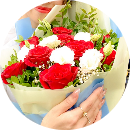người ơi giúp em với ạ em cảm ơn ạ
Read the following passage and mark the letter A, B, C or D to indicate the correct word or phrase that best fits each of the numbered blanks.
The Songkran Festival
The Songkran Festival is the Thai New Year’s Festival. The Thai New Year’s Day is 13 April every year, but the holiday period includes 14 -15 April as well.
The Songkran celebration is rich with symbolic traditions. Mornings begin with merit-making. Visiting local temples and offering food to the Buddhist monks is commonly practiced. On this specific occasion, performing water pouring on Buddha statues is considered an iconic ritual for this holiday. It represents purification and the washing away one’s sins and bad luck. As a festival of unity, people who have moved away usually home to their loved ones and elders. As a way to show respect, younger people often practice water pouring over the palms of elders’ hands. Paying respect to ancestors is also an important part of Songkran tradition.
The holiday is known for its water festival which is mostly celebrated by young people. Major streets are closed for traffic, and used as areas for water fights. Celebrants, young and old, participate in this tradition by splashing water on each other.
26. How long does the Songkran festival last? *
1 điểm
A. 3 days.
B. 1 day.
C. 13 days.
D. 14 days.
27. What does water pouring on Buddha statues symbolizes? *
1 điểm
A. Bad luck.
B. Purification.
C. Respect.
D. Ancestors.
28. Younger people often pour water over the palms of elders’ hands to show ….. *
1 điểm
A. Good luck.
B. unity.
C. purification.
D. respect.
29. Why the Songkran festival is a festival of unity? *
1 điểm
A. Because younger people will pay respect to ancestors.
B. Because water is poured on Buddha statues.
C. Because younger people will show respect to the elderly.
D. Because young people who have moved away usually return home to their loved ones and elders.
30. Which of the following statements ins not TRUE of the water festival? *
1 điểm
A. Major streets are closed during the festival.
B. People splash water on each other.
C. Major streets are closed for water fights.
D. Young people do not usually celebrate the festival.
The Songkran Festival
The Songkran Festival is the Thai New Year’s Festival. The Thai New Year’s Day is 13 April every year, but the holiday period includes 14 -15 April as well.
The Songkran celebration is rich with symbolic traditions. Mornings begin with merit-making. Visiting local temples and offering food to the Buddhist monks is commonly practiced. On this specific occasion, performing water pouring on Buddha statues is considered an iconic ritual for this holiday. It represents purification and the washing away one’s sins and bad luck. As a festival of unity, people who have moved away usually home to their loved ones and elders. As a way to show respect, younger people often practice water pouring over the palms of elders’ hands. Paying respect to ancestors is also an important part of Songkran tradition.
The holiday is known for its water festival which is mostly celebrated by young people. Major streets are closed for traffic, and used as areas for water fights. Celebrants, young and old, participate in this tradition by splashing water on each other.
26. How long does the Songkran festival last? *
A. 3 days.
B. 1 day.
C. 13 days.
D. 14 days.
27. What does water pouring on Buddha statues symbolizes? *
1 điểm
A. Bad luck.
B. Purification.
C. Respect.
D. Ancestors.
28. Younger people often pour water over the palms of elders’ hands to show ….. *
1 điểm
A. Good luck.
B. unity.
C. purification.
D. respect.
29. Why the Songkran festival is a festival of unity? *
1 điểm
A. Because younger people will pay respect to ancestors.
B. Because water is poured on Buddha statues.
C. Because younger people will show respect to the elderly.
D. Because young people who have moved away usually return home to their loved ones and elders.
30. Which of the following statements ins not TRUE of the water festival? *
1 điểm
A. Major streets are closed during the festival.
B. People splash water on each other.
C. Major streets are closed for water fights.
D. Young people do not usually celebrate the festival.





